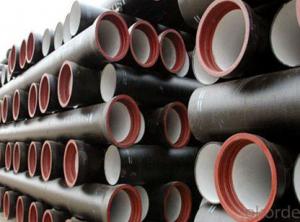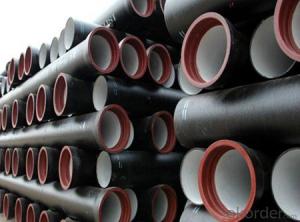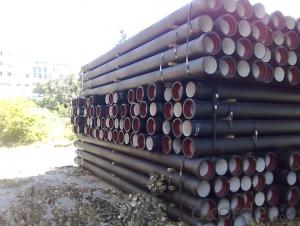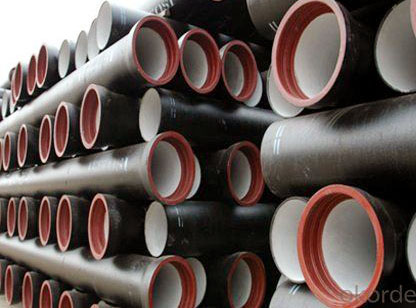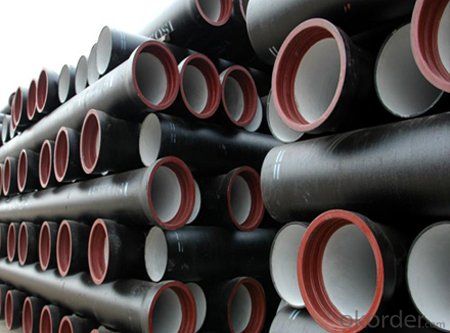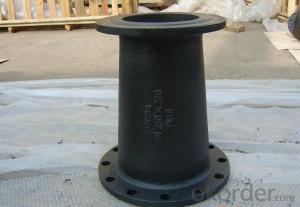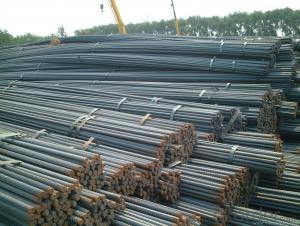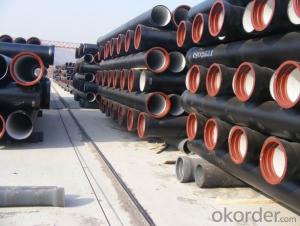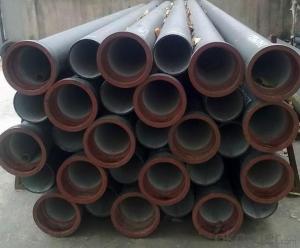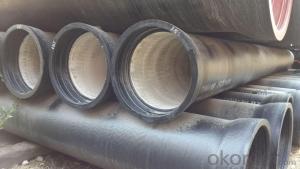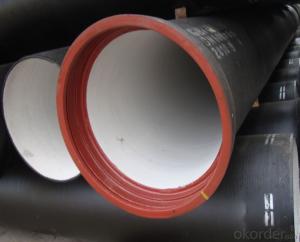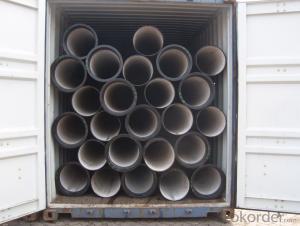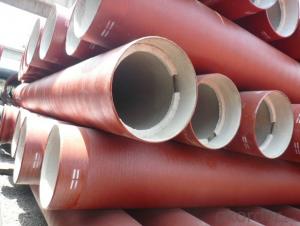New Ductile Iron Pipes of China DN200 EN598
- Loading Port:
- China main port
- Payment Terms:
- TT or LC
- Min Order Qty:
- 24 m.t.
- Supply Capability:
- 300000 m.t./month
OKorder Service Pledge
OKorder Financial Service
You Might Also Like
1. Ductile Iron Pipe Description :
2) Pipe ends: Spigot and socket ends, with 100% SBR rubber gaskets accoding to ISO4633
3) we can do third party inspection according to customer's request.
4) Our products have been sold to many international market, such as Middle East and South East Asia and Africa.
2. Main Features of the Ductile Iron Pipe:
Material: Ductile iron grade 500-7/ 450-10 in accordance with ISO1083
Test: In accordance with ISO 2531 / EN 545 / EN598 and 100% water pressure test
Rubber: NBR, SBR, EPDM according to ISO4633 / EN681.1
Note: The gaskets, bolts & nuts are supplied respectively as your special requirement
Standard: ISO 2531, EN545, EN598, ANSI, AWWA
Certificate: ISO9001, ISO14001, SGS, NSF, WRAS
Length: 6m or cut into 5.6m, 5.7m, 5.8m
Internal Lining: Cement, conform to ISO4179
3. Ductile Iron Pipe Images:
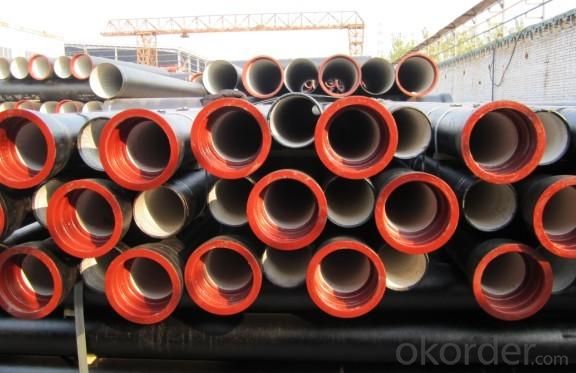
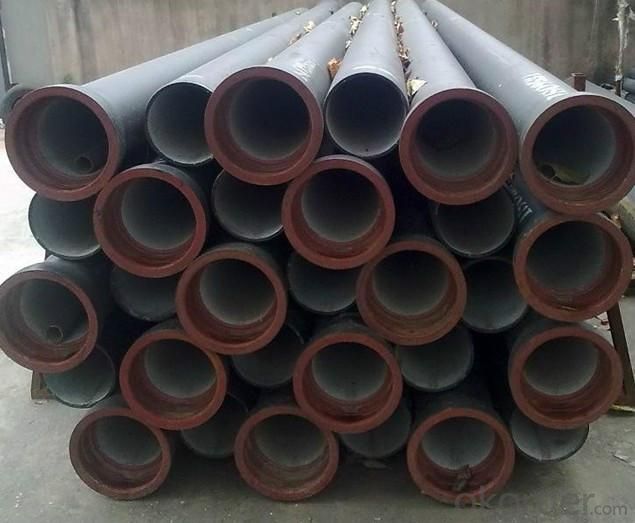
4. Ductile Iron Pipe Specification
Shape: Round
Hardness: 230
Pipe Wall Thickness: standerd
Pull Strength: 420
Yield (≥ MPa): 300
Material: Ductile Iron
water ductile iron pipe: SO2531 / EN545 DI pipe
Additional Services: Internal Coating
Packaging: packed in bag, plastic bag, steel strip, steel wire,double wire, iron box, wooden box, tarpaulin, plastic sheeting
Test: X-ray, UT, magnetic particle,inspection,hydrostatic test.
Processing service: Beveling, Threading, Slotting, Cut-to length, Bends, Quench and Temper, Fabrication, Double-jointing and On-site assistance
5.FAQ:
We have organized several common questions for our clients,may help you sincerely:
1.Q: Why would you choose ductile iron pipe rather than other pipe materials?
A:The reasons are obvious for that not only ductile iron pipe possesses the inherent strength and flexibility of ductile iron, combined with proven corrosion protection systems, but also the cost savings can be achieved from design to installation and commissioning.
2.Q:Why can you guarantee the inner of pipes can’t be corroded?
A: High alumina cement mortar lining and sulphate-resistant cement mortar lining. These two special linings are applicable to inner anti-corrosion for sewage pipes, improving resistance to erosion of the sewage components.
- Q: How are ductile iron pipes protected against mechanical damage?
- Various measures are implemented to protect ductile iron pipes from mechanical damage, ensuring their durability and longevity. One effective approach involves applying a protective coating to the exterior surface of the pipes. This coating acts as a barrier, safeguarding the ductile iron from physical abrasion, impact, and corrosion. Depending on specific requirements and environmental conditions, the coating can be composed of materials such as epoxy, polyethylene, or zinc. In addition to the protective coating, ductile iron pipes are designed with a high level of structural strength. They are manufactured to withstand significant pressure and external forces, making them less vulnerable to mechanical damage. The inherent strength of the material enables the pipes to resist deformation and cracking, even when subjected to heavy loads or ground movements. Moreover, proper bedding and backfilling techniques are employed during the installation of ductile iron pipes. This involves carefully placing the pipes in a prepared trench to ensure a stable foundation and minimize the risk of external forces causing damage. The correct backfill material is then used to provide support and prevent excessive pressure on the pipes. To further enhance protection against mechanical damage, additional measures such as concrete encasement or protective sleeves are often employed during the installation of ductile iron pipes. Concrete encasement involves surrounding the pipe with a layer of concrete, offering an extra layer of defense against external forces. Protective sleeves can also be utilized in areas prone to impact or where additional protection is necessary. Regular inspections and maintenance play a crucial role in ensuring the continuous protection of ductile iron pipes against mechanical damage. Periodic checks for signs of wear, corrosion, or other forms of damage enable timely repairs or replacements, preventing further deterioration. In summary, a combination of protective coatings, structural strength, proper installation techniques, and regular maintenance effectively safeguards ductile iron pipes against mechanical damage, guaranteeing their reliable performance and long lifespan in various applications.
- Q: It's not easy to drill ductile iron with cobalt high speed steel bit. Please help to point it out
- Determine the authentic M35 cobalt bit, which is about 65HRC in hardness. General workpiece hardness of about 45HRC or less of the problem.
- Q: How do ductile iron pipes handle pressure surges in pumping stations?
- Ductile iron pipes are known for their strength and durability, making them well-equipped to handle pressure surges in pumping stations. These pipes have a high resistance to impact and are designed to withstand the sudden increase in pressure that occurs during surge events. Additionally, their flexible nature allows them to absorb and distribute the force exerted by the surge, minimizing the risk of pipe failure or damage. Overall, ductile iron pipes are a reliable choice for handling pressure surges in pumping stations.
- Q: Ductile iron pipe in the direction of it?
- The utility model is mainly used for conveying water, and is an ideal choice for tap water pipes.
- Q: How do ductile iron pipes handle dynamic loads?
- Ductile iron pipes are well-suited to handle dynamic loads due to their high tensile strength and flexibility. The inherent ductility of the material allows the pipes to withstand the stress and strain caused by dynamic loads, such as water hammer or ground movement, without fracturing or breaking. This makes them a reliable choice for applications where frequent load variations or transient events are expected.
- Q: Can ductile iron pipes be used for railway crossings?
- Yes, ductile iron pipes can be used for railway crossings. Ductile iron is a strong and durable material that can withstand heavy loads and high traffic volumes, making it suitable for railway crossings. Additionally, it has excellent corrosion resistance properties, which is important for withstanding the harsh environmental conditions associated with railway crossings.
- Q: Do ductile iron pipes require concrete encasement for support?
- Concrete encasement is typically necessary for providing support to ductile iron pipes. This encasement offers extra stability and strength, safeguarding the pipes against pressure-induced shifting or collapsing. Furthermore, it aids in evenly distributing the load along the pipe's length and shielding it from external forces like soil movement or heavy vehicular activity. In addition to these benefits, concrete encasement helps reduce the likelihood of corrosion or damage caused by external impacts, thereby ensuring the long-lasting durability of the ductile iron pipes.
- Q: What is the typical diameter range of ductile iron pipes?
- The typical diameter range of ductile iron pipes is between 4 inches and 64 inches.
- Q: How can the three pipes of ductile iron leak?
- The raw material used in RE can be installed in the thread, can also be used on the same thread AB, re install is also available, but it is hard to remove.
- Q: How much is the installation cost of the ductile iron tube?
- Water supply pipe is the first choice, with high cost performance. Compared with the PE pipe, from the installation time, ductile pipe PE pipe installation is simple and rapid, and after the installation of internal and external pressure bearing better tightness and corrosion resistance; from the point of view, ductile pipe sealing better after installation, but also can improve the corrosion resistance through various anti-corrosion methods;
Send your message to us
New Ductile Iron Pipes of China DN200 EN598
- Loading Port:
- China main port
- Payment Terms:
- TT or LC
- Min Order Qty:
- 24 m.t.
- Supply Capability:
- 300000 m.t./month
OKorder Service Pledge
OKorder Financial Service
Similar products
Hot products
Hot Searches
Related keywords
